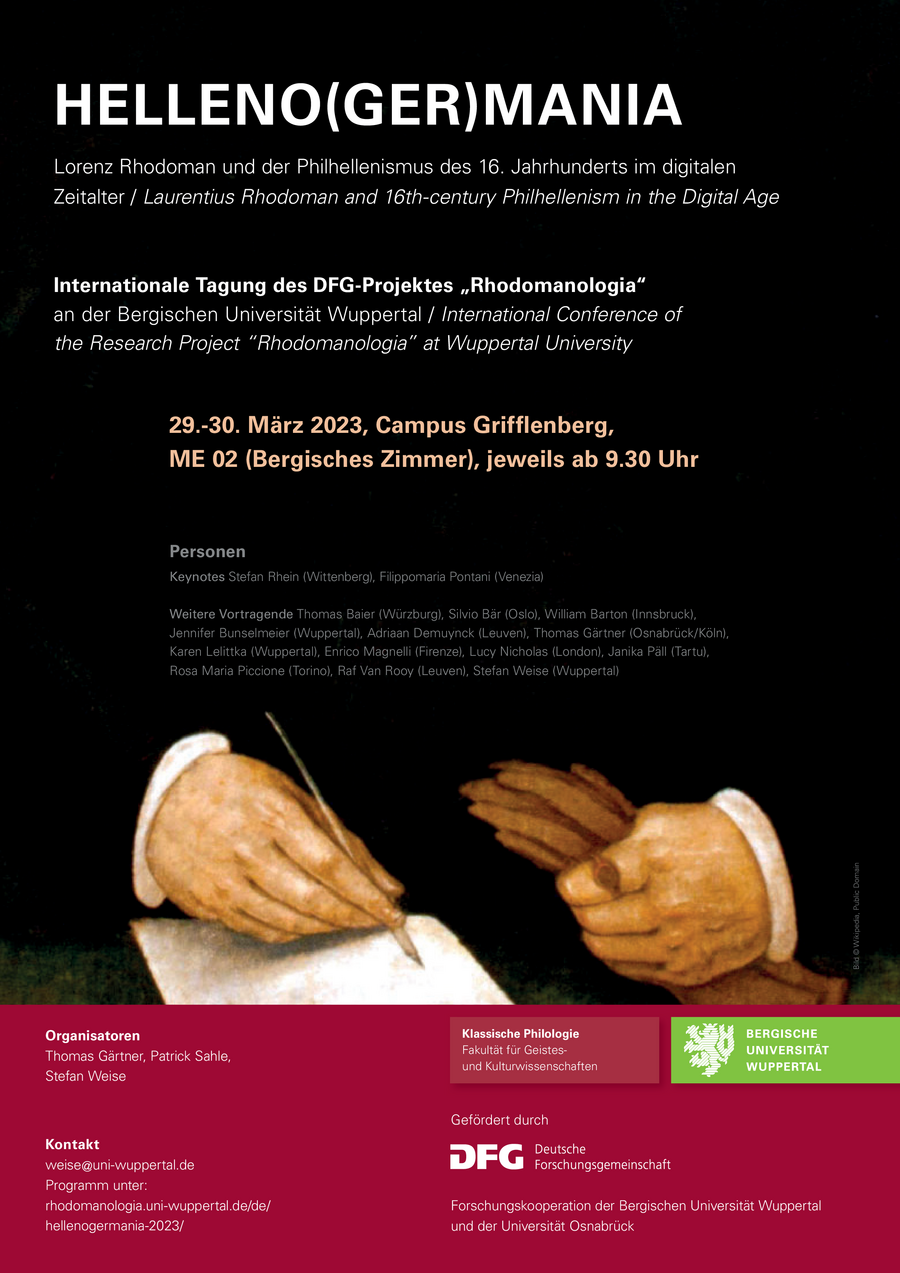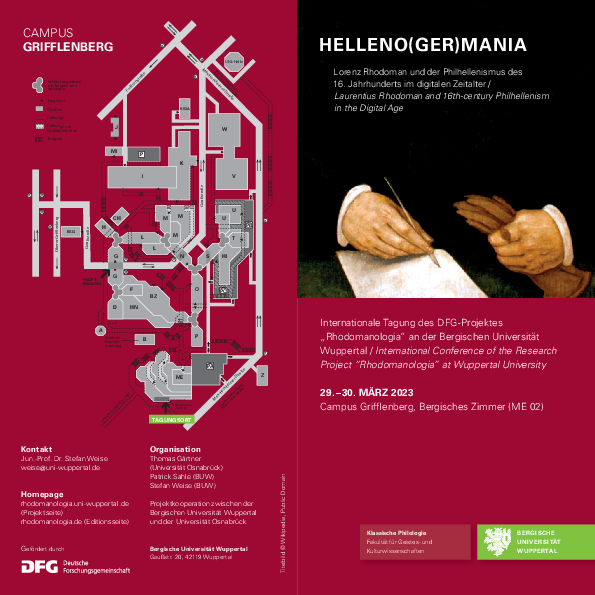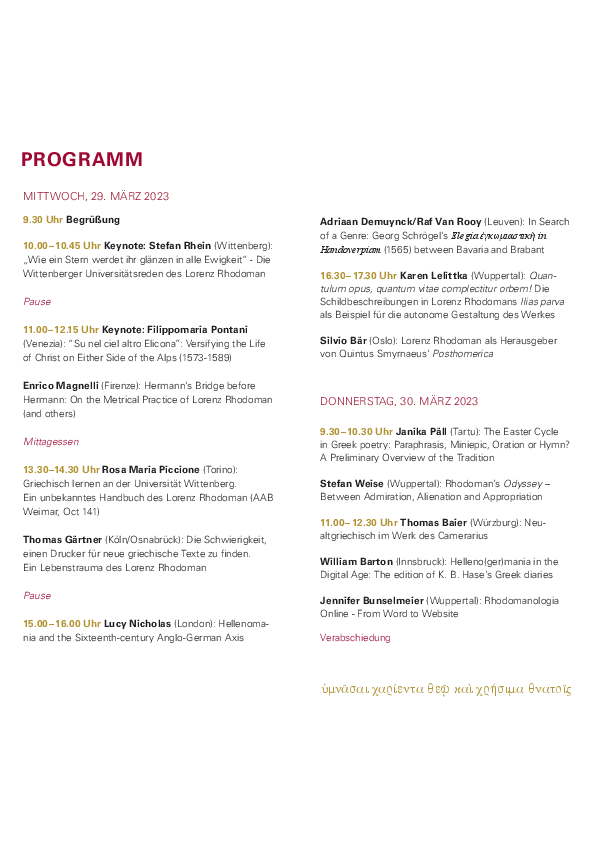HELLENO(GER)MANIA - Lorenz Rhodoman und der Philhellenismus des 16. Jahrhunderts im digitalen Zeitalter
Am 29. und 30. März 2023 fand an der Bergischen Universität Wuppertal unsere Projekttagung statt.
Keynotes hielten Dr. Stefan Rhein (Wittenberg) und Prof. Dr. Filippomaria Pontani (Venedig).
Programm und Handouts zu den Vorträgen finden Sie noch einmal hier.
Programm
29. März
- 9.30 Uhr Begrüßung
- 10.00-10.45 Uhr Stefan Rhein (Wittenberg): "Wie ein Stern werdet ihr glänzen in alle Ewigkeit" - Die Wittenberger Universitätsreden des Lorenz Rhodoman
Abstract: The lecture introduces Rhodoman's Wittenberg years (Oct. 1601 – Jan. 1606) and focuses on his professional activities as a professor of history at the Leucorea. In this position, he delivered numerous speeches: the inaugural lecture, the speech celebrating the centenary of the university, the speech on the Greek language, and the speech on philosophical life. Furthermore the portrait of Rhodoman, which is said to have been created in Wittenberg, will be presented. And finally the events following his death will be discussed: the funeral and the memorial to the deceased (Manes Laurentii Rhodomanni).
Pause
-
11.00-11.45: Filippomaria Pontani (Venezia): "Su nel ciel altro Elicona": Versifying the Life of Christ on Either Side of the Alps (1573-1589) Handout
Abstract: Versifying the Gospel is a long-standing and widespread exercise in Europe during the second half of the 16th century: it gained popularity mainly, though by no means only, in Germany and in the Reformed countries. We shall try to investigate its (somehow problematic) origins and to draw a preliminary list of some of its main representatives (irrespective of their proficiency), with a special focus on two of the most outstanding figures, namely the Italian Tito Prospero Martinengo and the German Lorenz Rhodoman. This may lead to some thoughts not only on the literary sources of both authors, but also on the purpose, the quality and the historical meaning of this kind of (broadly speaking) “paraphrastic” poetry on either side of the Alps, under partly different partly convergent religious and cultural conditions.
-
11.45-12.15: Enrico Magnelli (Firenze): Hermann's Bridge before Hermann: On the Metrical Practice of Lorenz Rhodoman (and others) Handout
Abstract: ‘Hermann’s Bridge’, i.e. the strong tendency of the Greek hexameter (especially post-classical) to avoid word-break after the first short syllable of the fourth foot, was discovered by the great Gottfried Hermann in 1805. Before his epoch-making Orphica, from the fifteenth to the beginnings of the nineteenth century a great number of humanists, learned men and professional scholars had been writing innumerable Greek poems obviously paying no attention to the still unknown metrical rule—all the more since in Latin poetry of the Classical age such verse structures are perfectly acceptable (modulatur amabile carmen). Yet it proves quite remarkable that some 15th-century Hellenists, apparently unaware of such restrictions, nonetheless place a word-end after the ‘fourth trochee’ very rarely. Lorenz Rhodoman is one of them. In my paper I compare the metrical practice of some poems of his—Arion, Ilfelda Hercynica, Historia Ecclesiae, Threnos, the poem for Joseph Scaliger, the Troica, and the lengthy Poesis Christiana. Palaestinae [...] libri IX—with that of other humanists, viz. Poliziano, Filelfo, Scaliger, Sebastian Châtillon, Konrad Rittershausen, hoping to shed some light on Rhodoman’s peculiar sensitivity to the niceties of Greek metre. Needless to say, this is just a first step, editorum doctorumque virorum in usum. Much work remains to be done, especially on the poetry of Rhodoman’s German contemporaries: the case of his friend and colleague Matthaeus Gothus, who seems to share his metrical taste, is a telling one and invites to devote further studies to the school of Michael Neander.
Pause
- 13.30-14.00 Rosa Maria Piccione (Torino): Griechisch lernen an der Universität Wittenberg. Ein unbekanntes Handbuch des Lorenz Rhodoman (AAB Weimar, Oct 141)
Abstract: The paper aims at presenting a handbook for Greek language teaching, which Lorenz Rhodoman set up between the 16th and the 17th century (Anna-Amalia-Bibliothek Weimar, Oct 141). Nucleus of the book is one of Erasmus’ several editions of Latin pedagogical and paraenetic texts (Magdeburg 1578, apud Wolfgang Kirchner), extended with selected texts written down from contemporary printed editions. Furthermore, the book contains a so far unknown Greek translation of some of these texts as the Disticha Catonis. The inquiry of the artefacts shows that this book was set up ad usum scholarum. The paper intends to provide an overview of Rhodoman’s sources and of teaching methods as well, leading to the setting up of this singular book.
- 14.00-14.30 Thomas Gärtner (Köln/Osnabrück): Die Schwierigkeit, einen Drucker für neue griechische Texte zu finden. Ein Lebenstrauma des Lorenz Rhodoman
Pause
- 15.00-15.30 Lucy Nicholas (London): Hellenomania and the Sixteenth-century Anglo-German Axis Handout
Abstract: This paper will examine an overlooked bond that existed between the nations of England and Germany at a critical moment during the sixteenth century, namely a shared commitment to Greek studies. With a particular focus on a circle of scholars based at Cambridge University and the (then German) city of Strasbourg, I will explore the nature of this connection in two ways. I will start with the figure of Martin Bucer, a Protestant reformer and leading Hellenist from Strasbourg, who, in 1549, upon an invitation from King Edward VI, left Strasbourg to take up a post as Regius Professor of Divinity in Cambridge. Within two years he was dead. The first part of this paper will consider the extravagant commemoration of Bucer by members of the University that ensued after his death. Cantabrigian grief was given expression in a work entitled De obitu doctissimi et sanctissimi theologi doctoris Martini Buceri (1551), a festschrift, that included 53 poems written in Latin and Greek that both celebrated and mourned Bucer, and powerfully attested to his spiritual leadership there. The second Anglo-German linkage to review will be the protracted correspondence of two classical scholars and reformers, Roger Ascham in Cambridge, and Johannes Sturm, the leading light of the Strasbourg Gymnasium in Germany. The many letters they wrote over twenty years point to a deep mutual interest in Greek authors. Their exchanges also speak to a joint determination to put this ancient language at the heart of an education system that they believed should be directed towards one goal: the rehabilitation of true Christian worship. These two examples of intersection raise important questions about the significance of the Greek language during this period. I will be probing the extent to which Greek was being harnessed to a specifically Protestant cause at this point in the Reformation. At the same time, it is also possible to query how closely aligned and coordinated the reform movements in these respective regions were, driven as they were by the Greek-buttressed programmes of a doughty band of cross-border hellenophiles.
- 15.30-16.00 Adriaan Demuynck/Raf Van Rooy (Leuven): In Search of a Genre: Georg Schrögel's Elegia ἐγκωμιαστικὴ in Handoverpiam (1565) between Bavaria and Brabant
Abstract: In 1565, a laudatory poem on Antwerp was published at the Plantin Press by the poorly known writer from Bavaria Georg Schrögel (fl. 1550–76), or in his Latin alias Georgius Schroegelius. The full title of the 24-page poem in New Ancient Greek is Elegia ἐγκωμιαστικὴ in clarissimam et praestantissimam Belgarum urbem Handoverpiam Georgii Schrœgelii Boii. Schrögel wrote the poem at the occasion of the inauguration of the newly built city hall in Antwerp in February 1565, during which parts of the poem may have been recited. People attending the inauguration could perhaps buy one of the 500 copies printed for the event, but further historical details are currently still lacking. Not only the author and circumstances of composition remain a little enigmatic. The poem’s genre, too, presents a complex puzzle, combining elements from elegy, laudatory oration, epic poetry, and ecphrasis. In our presentation, we aim to introduce the poem and insist in detail on its genre features, arguing that it is very hybrid, in keeping with other poetical laudes urbium of the sixteenth century written in Latin and Greek. Indeed, Schrögel’s Greek Elegia ἐγκωμιαστική forms an exceptional representative of an experimental genre in statu nascendi.
Pause
- 16.30-17.00 Uhr Karen Lelittka (Wuppertal): Quantulum opus, quantum vitae complectitur orbem! - Die Schildbeschreibungen in Lorenz Rhodomans Ilias parva als Beispiel für die autonome Gestaltung des Werkes Handout
Abstract: By composing the Ilias parva, Lorenz Rhodoman resumes the ancient tradition of 'argumenta' and combines, in compressed form, the content of the 24 books of Homer’s Iliad and the 14 books of Quintus Smyrnaeus’ Posthomerica in one single work, not only in Greek but also in Latin verse. The work stands especially out because it includes three 'ekphraseis' – two describing the shield of Achilles in the 'argumenta' of Iliad 18 and Posthomerica 5 as well as one describing the shield of Eurypylus in the 'argumentum' of Posthomerica 6. On the basis of these 'ekphraseis', the paper examines Rhodoman’s treatment of the original texts by regarding content and poetic arrangement. The main focus lies on the Latin versions of the descriptions but the Greek version will be discussed as well. It will be shown that Rhodoman pursues both a poetical and a pedagogical claim: He does not follow the tradition of mere 'imitatio' of Homer and Quintus but creates his own 'opus' by adapting his models and setting different emphases. There is also a parenetic undertone as well as a moralizing tendency Rhodoman apparently wants to pass on his target readership: his students.
- 17.00-17.30 Uhr Silvio Bär (Oslo): Lorenz Rhodoman als Herausgeber von Quintus Smyrnaeus' Posthomerica Handout
Abstract: In the 1960s, Francis Vian published his critical edition of Quintus of Smyrna’s Posthomerica in three volumes (1963, -66, -69). Monumental as Vian’s opus grande was – and still is, unsurpassed to this day – it rested on the shoulders of a giant: Lorenz Rhodoman. More than 150 years after its rediscovery by the Byzantine scholar Basilius Bessarion and more than 100 years after the publication of its first print by the Aldine press, Rhodoman was the first scholar who produced a critical edition of the Posthomerica. Although still based on the erroneous text of the Aldine (it was as late as 1807 that Thomas Christian Tychsen published a critical edition of Quintus’ epic based on a collation of the manuscripts), Rhodoman’s work on the text of the Posthomerica was groundbreaking. In this paper, I will look at how and why Rhodoman started working on parts of the text of the Posthomerica as a young scholar in 1577, only to return to it again almost three decades later – an enterprise that led to the publication of a complete edition just a few years before his death (1604). Furthermore, I will present and discuss a selection of Rhodoman’s textual emendations and conjectures; thus, I attempt to develop a better understanding of how the scholar understood Quintus’ epic and how he influenced later scholars and critics – and keeps doing so until today.
30. März
- 9.30-10.00 Uhr Janika Päll (Tartu): The Easter Cycle in Greek Poetry: Paraphrasis, Miniepic, Oration or Hymn? A Preliminary Overview of the Tradition
Abstract: During the 2nd half of the 16th century, several longer Greek Christological poems were written and printed. A great number of these poems is dedicated to the Easter Cycle, from Christ’s passion to the Resurrection. Initially issued mainly in Wittenberg and Leipzig, by the end of the century the tradition had spread to many towns of Germany. The paper will examine this cross-section of verse oration, biblical paraphrases, Christological orations and hymns in Greek with a special focus on the role of synoptic gospels in this tradition.
- 10.00-10.30 Uhr Stefan Weise (Wuppertal): Rhodoman's Odyssey - Between Admiration, Alienation and Appropriation Handout
Abstract: This paper gives a cursory survey of Rhodoman’s use of Odysseus and the Odyssey in his poetic works. It is divided into four sections: The first presents some important statements by Rhodoman on Homer in general, the second analyses Rhodoman’s depiction of Odysseus in his Trojan poems Troica and Ilias parva, the third shows Odyssean echoes in Rhodoman’s epyllion Arion and the fourth considers autobiographical passages with Odyssean imagery.
Pause
- 11.00-11.30 Uhr Thomas Baier (Würzburg): Neualtgriechisch im Werk des Camerarius Handout
Abstract: The paper will first give an overview of the structure and aims of the Camerarius project. Subsequently, Camerarius' significance as a Hellenist will be examined. A theological justification for the study of Greek is provided by the Κατήχησις τοῦ Χριστιανισμοῦ (1552): according to Camerarius, Greek has to be studies in his own time, for it represents Christian truths of faith. It has absorbed them, as it were, into a vessel designed for this purpose. Likewise, the Greek language has allowed the Word of God to be preserved for a long time without distortion. The writing offers fundamental reflections on the treatment of Greek in modern times. Camerarius rendered outstanding services to the dissemination of Modern Ancient Greek through text editions, epigrams and a historical work in the style of Thucydides on the Smalcaldic War.
- 11.30-12.00 Uhr William Barton (Innsbruck): Helleno(ger)mania in the Digital Age: The edition of K. B. Hase's Greek diaries
Abstract: The ‘secret’ diaries of Franco-German scholar Karl Benedikt Hase (1780–1864) have represented a desideratum for scholars of Classical Philology and Byzantine Studies since shortly after their author’s death: Students and colleagues of Hase in Paris raced to make excerpts from the diary, which the scholar kept in Ancient Greek throughout his career, before the original volumes disappeared during the transfer of his estate. They would remain ‘lost’ for the next century, and were known only from the resulting manuscript of students’ excerpts until 2020. Following the rediscovery of nine original volumes in Weimar, a new project at the University of Innsbruck (LAGOOS, 2023–2028) has as its core aim an online edition of Hase’s diaries, alongside a series of analytical studies of the 2500 pages of surviving text, their author and context. After an introduction to Hase and his diaries, this paper will present the LAGOOS project’s plans for a digital edition of the Greek text. This will include reflection on the digital presentation of extensive archival material, details of the project’s use of the READ-COOP’s AI-transcription tool TRANSKRIBUS, the new transcription model for early modern Greek manuscripts and a look forward to the result of LAGOOS’ online edition.
- 12.00-12.30 Uhr Jennifer Bunselmeier (Wuppertal): Rhodomanologia Online - From Word to Website
Abstract: "As simple and straightforward as possible" is the project's motto for both the editing process and the digital edition itself. From the digital perspective, this means the challenges are threefold: 1. Establish a workflow that demands as little interaction with unfamiliar technical tools from the editor as possible. 2. Create a modern, easy-to-use digital edition that offers a classical, clean reading text as well as a more dynamic, digitally enhanced workplace. 3. Produce clean data that is consistent with the established standards and expectations of the digital humanities community. This paper will discuss these challenges and offer practical solutions.
zuletzt bearbeitet am: 15.04.2023



